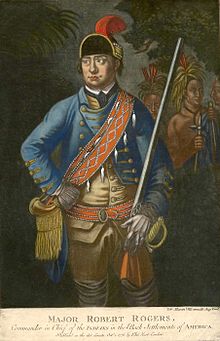Robert Rogers (soldier)
| Robert Rogers | |
|---|---|

This 1776 painting is the only known portrait of Robert Rogers from life and from the portrait painter's interpretation.
|
|
| Nickname(s) |
Wobomagonda ("White Devil") |
| Born |
7 November 1731 Methuen, Massachusetts |
| Died | 18 May 1795 (aged 63) London, England |
| Allegiance |
|
| Service/branch |
New Hampshire Militia (1746–1748) British Army (1755–1777) |
| Years of service | 1746–1748 1755–1766 1776–1777 |
| Rank | Lieutenant Colonel |
| Unit |
Rogers' Rangers Queen's Rangers King's Rangers |
| Battles/wars | |
King George's War
French and Indian War
Robert Rogers (7 November 1731 – 18 May 1795) was an American colonial frontiersman. Rogers served in the British army during both the French and Indian War and the American Revolution. During the French and Indian War, Rogers raised and commanded the famous Rogers' Rangers, trained for raiding and close combat behind enemy lines.
Robert Rogers was born to Irish immigrants James and Mary McFatridge Rogers on 7 November 1731 in Methuen, a small town in northeastern Massachusetts. At that time, the town served as a staging point for Scots-Irish settlers bound for the wilderness of New Hampshire.
In 1739 when Rogers was eight years old, his family relocated to the Great Meadow district of New Hampshire near present-day Concord, where James founded a settlement on 2,190 acres (8.9 km2) of land which he called Munterloney, after a hilly place in Derry, Ireland. Rogers referred to this childhood residence as "Mountalona". It was later renamed Dunbarton, New Hampshire.
In 1740, the War of the Austrian Succession (1740–1748) broke out in Europe and, in 1744, the war spread to North America where it was known as King George's War (1744–1748). During Rogers' youth (1746), he saw service in the New Hampshire militia as a private in Captain Daniel Ladd's Scouting Company and, in 1747, also as a private in Ebenezer Eastman's Scouting Company, both times guarding the New Hampshire frontier.
...
Wikipedia
